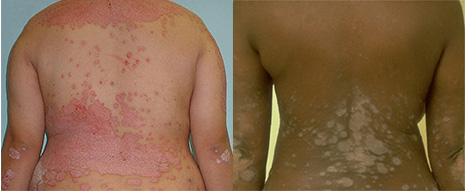Can you get psoriasis if you have skin of color?

In fair-skinned people, psoriasis tends to be red or pink, and the scale is often silvery white. A Hispanic person is more likely to have salmon-colored psoriasis and silvery-white scale. In African Americans, the psoriasis often looks violet and the scale gray. In dark skin, the psoriasis can also be dark brown and difficult to see.
Light and dark patches may appear when psoriasis clears
When psoriasis clears on medium to darkly colored skin, you may see lighter or darker patches of skin where the psoriasis once was. These patches are NOT scars and will eventually disappear. Clearing can take 3 to 12 months or longer.
Your dermatologist may call these patches “dyspigmentation” (dis-pig-men-ta-tion).
If the dark patches bother you, tell your dermatologist. Treatment that you apply directly to the skin may help dark patches clear more quickly.
Psoriasis treatment: Essentially the same for all skin colors
Skin color rarely affects how psoriasis is treated. If you have skin of color, however, there are a few things you should know about treatment.
Phototherapy: A treatment option that can cause the skin to darken. If your dermatologist prescribes phototherapy to treat your psoriasis, you’ll stand in a light box two or three times per week. The light from these treatments can cause the treated skin to tan or darken. If you have skin of color, it can also cause dark spots on your skin to become more noticeable. If you want to avoid skin darkening, be sure to tell your dermatologist. Another treatment may be an option.
Scalp psoriasis requires frequent shampooing. Most people who have psoriasis get it on their scalp at some point. Frequent shampooing helps to remove the scales. If you are of African descent, treatment usually involves shampooing with a medicated shampoo once or twice a week. You may also need to apply medicine to your scalp. If this causes a problem, a dermatologist can modify this treatment to your preferences. In other ways, psoriasis treatment is the same regardless of your skin color.
Images
Image 1: Used with permission of the Journal of the American Academy of Dermatology. (J Am Acad Dermatol 2011;65:164.)
Image 2: Used with permission of the American Academy of Dermatology National Library of Dermatologic Teaching Slides.
References
Alexis AF, Blackcloud P. “Psoriasis in skin of color: epidemiology, genetics, clinical presentation, and treatment nuances.” J Clin Aesthet Dermatol. 2014 Nov;7(11):16-24.
Gelfand JM, Stern RS. “The prevalence of psoriasis in African Americans: results from a population-based study.” J Am Acad Dermatol. 2005 Jan;52(1):23-6.
 Atopic dermatitis: More FDA-approved treatments
Atopic dermatitis: More FDA-approved treatments
 Biosimilars: 14 FAQs
Biosimilars: 14 FAQs
 How to trim your nails
How to trim your nails
 Relieve uncontrollably itchy skin
Relieve uncontrollably itchy skin
 Fade dark spots
Fade dark spots
 Untreatable razor bumps or acne?
Untreatable razor bumps or acne?
 Tattoo removal
Tattoo removal
 Scar treatment
Scar treatment
 Free materials to help raise skin cancer awareness
Free materials to help raise skin cancer awareness
 Dermatologist-approved lesson plans, activities you can use
Dermatologist-approved lesson plans, activities you can use
 Find a Dermatologist
Find a Dermatologist
 What is a dermatologist?
What is a dermatologist?